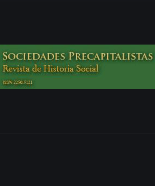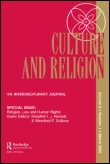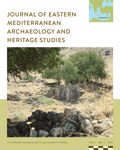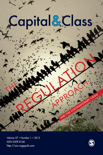
Sociedades Precapitalistas
Scope & Guideline
Advancing Knowledge on Pre-Capitalist Structures
Introduction
Aims and Scopes
- Historical Analysis of Socio-Economic Structures:
The journal emphasizes the examination of socio-economic relations within pre-capitalist societies, such as feudalism, wage labor, and agrarian systems, providing insights into how these structures shaped historical developments. - Interdisciplinary Approaches:
Utilizing methodologies from history, archaeology, and cultural studies, the journal fosters interdisciplinary research that enriches understanding of pre-capitalist societies through diverse lenses. - Focus on Marginalized Voices:
The journal highlights the writings and experiences of marginalized groups, including women and minority communities, thus contributing to a more inclusive historical narrative. - Cultural and Religious Contexts:
Exploring the interplay between culture, religion, and social structures, the journal investigates how belief systems influenced societal norms and power dynamics. - Geographical Diversity:
The journal covers a wide range of geographical contexts, including the Iberian Peninsula, Medieval Europe, and the ancient Mediterranean, thereby offering a comparative perspective on pre-capitalist societies.
Trending and Emerging
- Economic Relations in Premodern Contexts:
Recent papers have increasingly examined wage relations and economic practices in premodern societies, highlighting the complexities of labor dynamics and economic dependencies. - Cultural Histories of Marginalized Groups:
There is a noticeable rise in research focusing on the experiences of marginalized communities, including women and Jewish converts, reflecting a broader trend towards inclusivity in historical narratives. - Interconnectivity of Different Societies:
Emerging studies are exploring the interconnectedness of various pre-capitalist societies, particularly through trade, migration, and cultural exchange, suggesting a move towards understanding global historical dynamics. - Environmental and Agrarian Studies:
An increasing number of articles are addressing the relationship between agrarian practices and environmental contexts, emphasizing the importance of ecological factors in shaping historical societies. - Reassessment of Historical Narratives:
There is a growing trend towards re-evaluating established historical narratives, particularly those related to power dynamics and social hierarchies, indicating a shift towards critical historical analysis.
Declining or Waning
- Classical Antiquity Studies:
Research related to classical antiquity, particularly themes focused solely on ancient Greek and Roman societies, has become less frequent, suggesting a shift towards more contemporary historical contexts. - Theoretical Discussions on Feudalism:
Although feudalism remains a key topic, theoretical discussions surrounding its definition and implications appear to have waned, with fewer papers dedicated to abstract theorization and more emphasis on empirical case studies. - Narrow Focus on Specific Historical Figures:
Papers concentrating on individual historical figures or localized events, such as specific battles or political leaders, have decreased, indicating a broader focus on societal dynamics rather than singular narratives.
Similar Journals

Espana Medieval
Advancing Scholarship in the Heart of Medieval StudiesEspana Medieval is an esteemed academic journal dedicated to the exploration of medieval studies within the broader historical context of Spain. Published by the UNIV COMPLUTENSE MADRID, SERVICIO PUBLICACIONES, this peer-reviewed journal has established its reputation since becoming Open Access in 2004, thereby ensuring that vital historical research is accessible to a global audience. With an impressive Q1 ranking in History and a notable Scopus rank of 773 out of 1760, this journal plays a pivotal role in shaping contemporary scholarship in the field. Researchers and professionals can expect high-quality, rigorously vetted articles that delve into various aspects of medieval history, culture, and society, contributing to a richer understanding of the medieval past. Located in the vibrant academic milieu of Madrid, Spain, Espana Medieval continues to be a leading voice for historians, promoting innovative research and fostering academic discourse. Submissions from scholars worldwide are welcomed, encouraging a diverse array of perspectives on the medieval period.

Culture and Religion
Exploring the Intersections of Belief and SocietyCulture and Religion is a distinguished academic journal published by ROUTLEDGE JOURNALS, TAYLOR & FRANCIS LTD, focusing on the intricate relationships between cultural dynamics and religious practices. With an ISSN of 1475-5610 and an E-ISSN of 1475-5629, this journal has carved out a significant place in the Cultural Studies, Philosophy, and Religious Studies disciplines, as reflected by its current Q3 ranking in these fields. The journal aims to foster a critical dialogue among scholars and practitioners, providing a platform for innovative research that intersects diverse cultural and religious contexts. Although not fully open access, it is well-respected in the academic community, as indicated by its Scopus rankings—positioned at #316 in Religious Studies and #456 in Philosophy. Published in the United Kingdom, Culture and Religion invites contributions that advance understanding and stimulate scholarly debate about the roles of culture in shaping religious thought and experience, making it an essential resource for researchers, professionals, and students alike.

Journal of Eastern Mediterranean Archaeology and Heritage Studies
Decoding the Secrets of Ancient CivilizationsJournal of Eastern Mediterranean Archaeology and Heritage Studies, published by Penn State University Press, is a premier academic journal dedicated to the exploration and understanding of the archaeological and heritage landscapes of the Eastern Mediterranean region. With an ISSN of 2166-3548 and an E-ISSN of 2166-3556, this journal serves as an essential resource for researchers, professionals, and students in the fields of archaeology, conservation, and heritage studies. Its notable impact is reflected through its Q2 category rankings in both Archaeology and Conservation, coupled with commendable Scopus rankings, positioning it within the top quartiles of its disciplines. The journal not only fosters scholarly dialogue by publishing cutting-edge research but also aims to bridge the gap between academic inquiry and practical conservation efforts. As the field continues to evolve, this journal provides a vital forum for disseminating knowledge and advancing the preservation of cultural heritage, making it indispensable for all engaged in the study of the Eastern Mediterranean’s rich archaeological heritage.

Bulletin de la Societe Prehistorique Francaise
Fostering Scholarly Dialogue on Our Ancient HeritageBulletin de la Societe Prehistorique Francaise (ISSN: 0249-7638; E-ISSN: 1760-7361), published by the SOCIETE PREHISTORIQUE FRANCAISE, stands as a pivotal journal within the domain of archaeology, particularly emphasizing prehistoric studies. With its classification in the Q2 quartile of both the arts and humanities as well as social sciences in archaeology, the journal positions itself among the top 25% of publications in these categories as of 2023. This distinguished ranking reflects its significant contribution to the field, providing researchers, professionals, and students with critical insights and innovative methodologies related to prehistoric research. Although open access options are currently unavailable, the journal is committed to fostering academic discourse and sharing knowledge that influences contemporary archaeological practices. As a member of the elite academic community, Bulletin de la Societe Prehistorique Francaise is highly regarded for its rigorous peer-review process and dedication to the advancement of archaeology, making it an essential resource for anyone invested in understanding our historical roots.

Bulletin of the American Society of Overseas Research
Connecting disciplines to illuminate the tapestry of human history.Bulletin of the American Society of Overseas Research, published by the University of Chicago Press, serves as a premier platform for scholarly discourse in the fields of archaeology, cultural studies, and history. With its ISSN 2769-3600 and E-ISSN 2769-3589, this journal has swiftly established itself as a key resource for researchers, professionals, and students alike, demonstrating exceptional impact as evidenced by its Q1 rankings in multiple relevant categories for 2023. Notably, it holds the 93rd percentile rank in Arts and Humanities (History) and the 84th percentile in Social Sciences (Cultural Studies), evidencing its respected standing within the academic community. The journal's commitment to advancing knowledge and fostering interdisciplinary dialogue is complemented by its accessible publication from 2022 to 2024, making it an essential read for those engaged in the exploration of global cultural histories and archaeological research.

Capital and Class
Illuminating the Intersections of Capital and SocietyCapital and Class is a leading academic journal published by SAGE Publications Inc., dedicated to advancing the fields of Economics, History, Sociology, and Political Science. Since its inception in 1977, this esteemed journal has provided a critical platform for innovative research that examines the complexities of economic structures and their socio-political ramifications. With a distinguished presence in the academic community, it holds impressive rankings, including Q2 in Economics and Econometrics and Q1 in both History and Sociology and Political Science as of 2023. Furthermore, it stands out in the Scopus Rankings, occupying the 98th percentile in History and the 78th percentile in Sociology and Political Science. The absence of Open Access options enhances its exclusivity, making it a vital resource for researchers and professionals seeking substantial scholarly contributions. As it prepares for its next era of scholarship until 2024, Capital and Class continues to illuminate the intricate relations between capital, class structures, and the dynamics of social change, fostering dialogue and discourse among scholars and practitioners alike.

Journal of African Archaeology
Advancing Knowledge of Africa's Archaeological TreasuresJournal of African Archaeology is a premier academic publication dedicated to advancing the study of Africa's archaeological heritage. Published by BRILL, this journal offers a platform for innovative research and insights into the continent's rich historical narratives and cultural evolution. With a prestigious impact factor and distinguished rankings in multiple categories—including Q1 in Archaeology, Cultural Studies, and History—this journal is prolific in fostering scholarly discourse within the arts and humanities. The ISSN for print is 1612-1651 while the E-ISSN is 2191-5784, ensuring easy access to a diverse range of articles crafted by leading experts in the field. Researchers, professionals, and students alike will find valuable and rigorously peer-reviewed content that further enhances their understanding of African archaeological practices and theories. The Journal of African Archaeology thus stands as a vital resource for anyone invested in exploring the complexities and intricacies of Africa's past.

BULLETIN OF THE AMERICAN SOCIETY OF PAPYROLOGISTS
Exploring the Depths of PapyrologyThe Bulletin of the American Society of Papyrologists is an esteemed journal dedicated to advancing the field of papyrology and related studies in archaeology and history. Published by Peeters, this journal offers a rich array of scholarly articles that delve into the analysis and interpretation of ancient manuscripts and inscriptions, shedding light on historical contexts and cultural nuances. Its impressive impact factor places it in the Q1 category for history and Q2 for archaeology in the 2023 rankings, affirming its significance within the academic community. Though not an open-access publication, the journal remains accessible to researchers and institutions, fostering a collaborative environment for sharing discoveries and scholarly dialogue. With its publication history dating back to 2002, the Bulletin continues to be an essential resource for scholars, historians, and students interested in the complexities of ancient texts and civilizations.

Medievalismo
Transforming Perspectives on Historical NarrativesMedievalismo is a distinguished academic journal dedicated to the interdisciplinary study of medieval culture, history, and societal influences, published by the esteemed University of Murcia in Spain. Since achieving Open Access in 2010, it has fostered a rich environment for the dissemination of knowledge, encouraging contributions from researchers and scholars across diverse fields. The journal holds a notable Q1 ranking in History and exhibits strong performance metrics in Arts and Humanities and Cultural Studies, as evidenced by its relevant Scopus rankings. With a commitment to promoting high-quality research and discussion, Medievalismo has positioned itself as an essential resource for academics and students aiming to deepen their understanding of the medieval period. Situated in a vibrant scholarly landscape, it continues to publish transformative insights and foster critical dialogue, making significant contributions to the cultural and historical narratives of our time.

Revista de Historia da Sociedade e da Cultura
Advancing Knowledge of Social NarrativesRevista de História da Sociedade e da Cultura is a distinguished open access journal published by UNIV COIMBRA, FAC LETRAS, dedicated to advancing the field of history. Established in 2014, this journal has become a valuable resource for researchers, professionals, and students, encouraging the critical study of social and cultural history from multiple perspectives. With an E-ISSN of 2183-8615, it remains accessible to a global audience, promoting scholarly communication and collaboration. The journal's commitment to open access since 2016 ensures that high-quality research is available to all without financial barriers. Currently ranked in the third quartile (Q3) in the category of History by Scopus, it holds an impressive position within the academic community, with a Scopus rank of #950 among 1760 journals within arts and humanities, reflecting its impact and relevance in the field. By exploring both historical methodologies and contemporary cultural issues, Revista de História da Sociedade e da Cultura aims to contribute meaningfully to scholarly discourse and foster a deeper understanding of historical contexts, making it a pivotal journal for anyone interested in the ever-evolving narratives of our past.